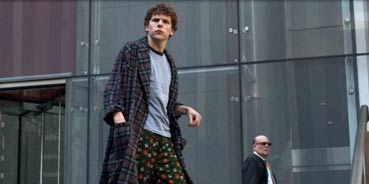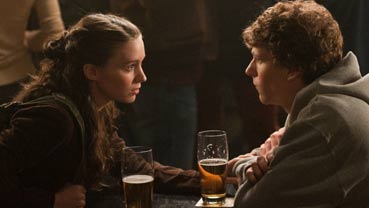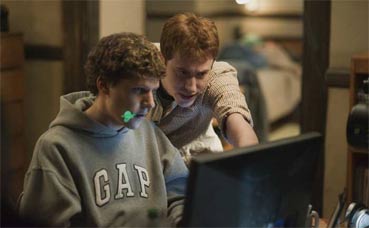"You're going to be successful and rich. But you're going to
go through life thinking that girls don't like you because you're
a tech geek. I want you to know, from the bottom of my heart,
that won't be true. It'll be because you're an asshole." |
Erica Albright (Rooney Mara) |
"You're not an asshole Mark, you're just trying too hard to be one." |
Marylin Delpy (Rashida Jones) |
Warning: the following review contains some spoilers
Like Charles Foster Kane, Jay Gatsby and Daniel Plainview before him, Mark Zuckerberg is the digital decade's personification of an unattainable American dream defined and destroyed by obsession. "Punk. Genius. Billionare", the words definitively slapped across his face in the film's advertising suggest this is how history will remember him, even though the events of the founding of Facebook chronicled in West Wing scribe, Aaron Sorkin's screenplay are based on the largely fictional, non-fiction account, The Accidental Billionaires, by Ben Mezrich.
In the hands of a refreshingly restrained David Fincher, the story of The Social Network is told through a Rashômon style courtroom device of two lawsuits against Zuckerberg running simultaneously. The first by two of Harvard's most esteemed students – Olympic rowers in waiting, the Winklevoss twins – claiming Zuckerberg stole their idea of an on-line social network that they informally employed him to work on as programmer; and the other, a $600 million dollar suit by Zuckerberg's business partner and only friend Eduardo Saverin, after being squeezed out of his share of the company, despite providing the startup funds and much of the subsequent capital.

With this dramatic structure in place, The Social Network is that rarity amongst modern bio-pics, one that dares to trust the viewer's intelligence without thuddingly announcing its flashback structure; the tried and tested routine of starting with something tense and exciting in the opening, then cheating you out of resolution of the event, only so that it can flip-flop between past and present for two hours, continually recapping through dialogue in the present what we just watched moments ago in the past, as if this is some kind of accepted shorthand for adding a level of profundity to too often predictable proceedings. Finally, we circle back to an opening that beat for beat is still exactly the same, but now over-scored in its emoting to tell us just how much intense insight we should be feeling with all the prior knowledge we're privileged enough to be privy to. A much lesser film would have opened with the depositions, flashed back to the events leading up to them and closed on a settlement. Bio-pic structure 101, but thankfully, not at all the case here. So engrossed was I in the verbal sparring betraying the character psychology and just trying to keep pace with the trademark Sorkin rapid-fire dialogue, that the timeline of events unfurled itself to me in a most organic way. I wasn't sure where I was some of the time in the first twenty minutes or so, but the assuredness of the direction was such that I knew it would eventually make sense (this was my experience for a much longer stretch of time during my first viewing of Fight Club, and I'll just put it on the table right now, in terms of direction, The Social Network is really the first time since, that Fincher has delivered on the promise of that earlier film).
Dropping us in medias res, right in the middle of a lacerating break-up scene before breathlessly hurtling us along the information super highway of invention, bathed in the film's signature autumnal campus glow, (courtesy of Fight Club lenser Jeff Cronenworth), Fincher then deftly and sneakily sets up a legal thriller that quickly sheds the albatross notion that bio-pics must be a sequence of key exciting events to condense a window on someone's life into two hours. Instead, what reveals itself is a goal-oriented tragedy of re-invention behind a computer screen. The question of intent and the drive behind Zuckerberg's obsession fascinates; just as prickly and unpinable as Jessie Eisenberg's portrayal, it's what makes a film with no three act structure, change of pace or obvious highs and lows so compulsively watchable for every minute of its 121 minute run time.
What is initially borne out of rejection and a childish desire to increase his chances with, and take revenge on the opposite sex has Zuckerberg laying the foundation of Facebook over a single night after being dumped by his girlfriend, Erica (a scene-stealing Rooney Mara, now getting her Dragon Tattoo For Fincher's remake), all the while assassinating her character on LiveJournal. As a result, Facebook is the shot heard round the world by all but the one person who matters to Zuckerberg – It's a second rejection from an understandably pissed Erica that prompts the knee jerk decision to 'expand' the project beyond the college elite. Zuckerberg will seemingly push himself and his creation as far and wide as they need to go in order to get Erica's attention, making 500 million virtual friends in order to preserve only one in actuality. Through a completely fictional addition to a real life story, Sorkin has uploaded Rosebud 2.0.

Bill Gates famously dropped out of Harvard to start Microsoft and Steve Jobs worked on the first home computer whilst holed up in his garage. One has to wonder what the tipping point was and who they were doing it for. Did they each have an Erica also? The film works hard to provide contrary evidence to what a pair of bookend scenes and quotes (atop this review) appear to reduce down to a classic case of "the girl that got away". The script posits Zuckerberg's obsession as only natural given a setting that breeds competitive impulses conditioned by the expectations of an Ivy League environment in which jobs are invented rather than applied for. While a resentful Zuckerberg spends a drunken evening of isolation in his dorm room building a club he can be the leader of, unknowingly about to forever change the way people chose to interact with one another in their daily lives, Fincher perceptively cross cuts to the exclusivity of the campus club Phoenix, which Zuckerberg is so desperate to be a member of (when Saverin, later becomes a member, this causes a serious rift in their working relationship and is a contributing factor to him being ousted from the company). Did Zuckerberg do this in part to win the popularity of the preppies he openly despises, or is this simply another spark that started the fire? Once it catches alight, maybe Erica and the people of the Phoenix have nothing to do with it? That to get ahead of the curve you have to break away from it and sever all ties. The goal becomes nebulous, eclipsing all other concerns outside of the obsession of invention; not knowing exactly why, only that you have to do it first, the dispute of which motors the entire film in and outside of the deposition hearings .
Friends and enemies alike simply aren't as obsessed as Mark is, so it's to be expected that he would outgrow Saverin, who although the business end of the venture proves to be far less business savvy than his partner, insisting that they swamp the site with the same ads that flatlined MySpace. The fatal mistake is of Saverin's own making when he decides to stay behind to intern in New York rather than follow the advice of "devil on the shoulder" and Napster creator, Sean Parker (Justin Timberlake playing him as a rockstar) and follow Mark to expand operations in Silicon Valley.
Similarly, the Winklevoss twins don't take affirmative action before it's too late, not because they aren't rightly outraged enough, but because their competitive impulses are channeled into rowing; their obsession is the Olympics, not social networking. If this pair of Harvard students weren't smart enough to figure out that in six weeks of not returning their phone calls, Zuckerberg was busy improving their idea so he could win the race, and that what they really needed was to call in someone else in to finish the job, then it's hard not to be in Zuckerberg's corner and cheer when he delivers the knockout blow:
"If you were the inventors of Facebook, you'd have invented Facebook."
This is one of a bounty of scolding retorts fired off by jostling alpha males at the same furious speed with which Zuckerberg writes code and types his hateful and damming LiveJournal. Male pushing and shoving is where Fincher has excelled before and just as in Fight Club he finds a tone that is equally comedic and tragic. Some of the humour boarders on John Hughes territory, which according to co-composer Trent Reznor, Fincher was initially trying to lean this towards with support of the music (thank God Trent and Atticus Ross were there to persuade him otherwise with a sleek, malevolent score in the timbre of Shakespearian tragedy). It's that lightness of touch that was drowned in the geyser of sentimentality that was The Curious Case of Benjamin Button and so unintentionally evoked in Panic Room, whether it be the hang-up with attention-seeking CGI camera moves going through kitchen cabinets and down drain pipes or Jared Leto's cornrows. The movie that was more a show reel for technological gimmicky now looks like a simplistic protype compared to the swooping "where no camera has gone before" wizardry and bravado of Gasper Noe's Enter the Void. Honestly, I found it hard to take Zodiac seriously at all when you had boyish Jake Gyllenhaal taking on a man's role and looking more like a kid playing dress up as detective.

Just like his protagonist, Fincher is so obsessed with saying he did it first, that his movies are often hard to like. The heart of Benjamin Button had no pulse, because the script had only treacle to go on in the absence of a director seemingly more concerned about winning technical awards with the admittedly incredible technologies employed to age Brad Pitt backwards. Even his latest falls foul of an impressive but pointless use of technology. Fincher hired actors Armie Hammer & Josh Pence to play Cameron & Tyler Winklevoss but replaced Pence's face with Hammer's for the entire film. You never question the effect for a single frame, but I was left asking, "across the whole united states, were there really no twin brother football player-sized jocks they could've found in casting?"
The simple fact is, you just don't need effects in a war of egos this big with dialogue that really talks the talk and in this sense the credit above the title ought to read "a film by Aaron Sorkin and David Fincher". It really comes off as a straight down the middle fifty-fifty, split, with Sorkin's contribution getting most of the word of mouth. Take the scene where Zuckerberg cuts down The Winklevoss' lawyer, effectively proclaiming the establishment as something that will soon be overthrown by the geeks who will inherit the earth: "You have part of my attention – the minimum amount". It tells you so much about where the character is coming from, but one of the true surprises of the film is that I didn't expect it to ring with such acerbic hilarity. With so many millions of dollars at stake and with all the accusations hurled at him, Zuckerberg doesn't crack, not once – not a single solitary tear. The emotion is there but not the means to express it. To the bitter end Eisenberg is inscrutable, playing Zuckerberg as someone purposely trying to be the biggest asshole in the room. It's not just a bi-product of genius but the default coping mechanism of someone who despite the scope of his ambition, is so socially constipated he boarders on severe Asbergers.
Nowhere are you given such a complete picture of Zuckerberg's condition, than the opening scene. We've all been in that situation where, so anxious to impress someone we overstep the line and say completely the wrong thing, only to keep digging the hole deeper and deeper as we desperately try to amend ourselves in that person's eyes. Never have you seen a hole dug so fast and so deep as it is here. The scene gets more and more squirmish with every utterance, Zuckerberg becoming evermore obnoxious and condescending as he tries in vain to back-track. Shockingly unaware that a world exists outside his own head, Eisenberg plays unlikable without making it the defining character trait. While Zuckerberg's intentions are far from wholesome, I think it comes more down to the fact that his synapses are firing at such a rate of knots, he has a hard time censoring his thought process and no matter how much money and noterioty he gains with his invention that he's doomed to never comprehend the emotional responses of ordinary people.
Genius. Punk. Billionare. Asshole? Timothy E. RAW doesn't like this status update.
|